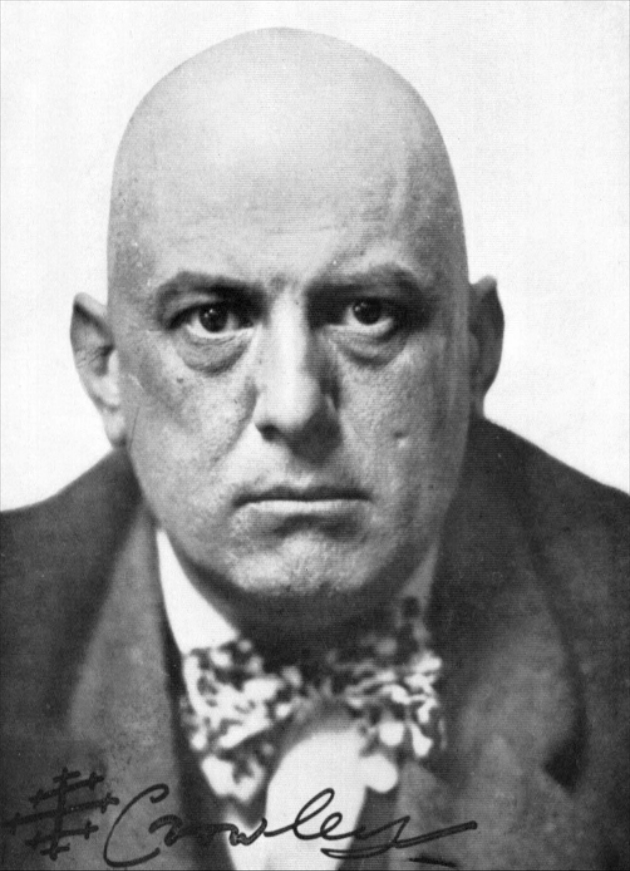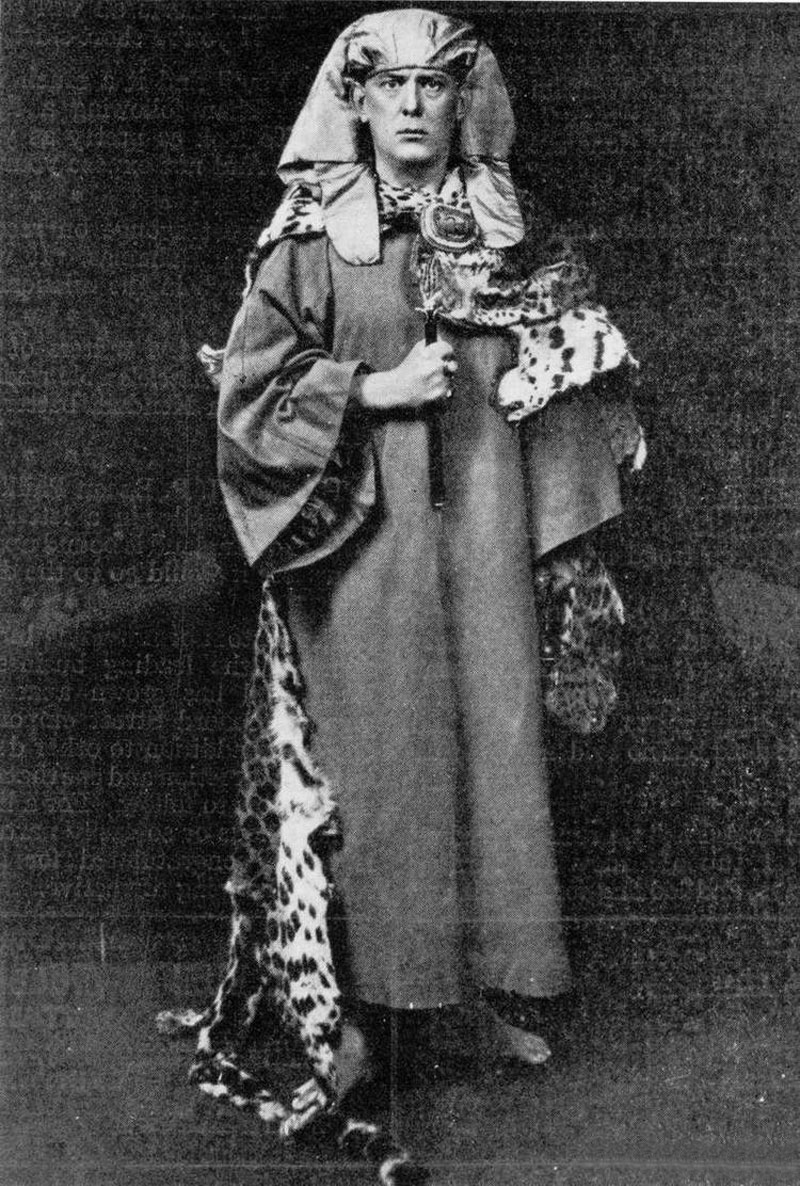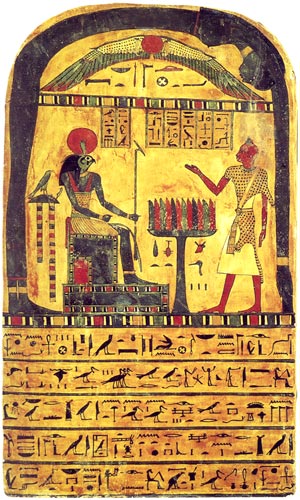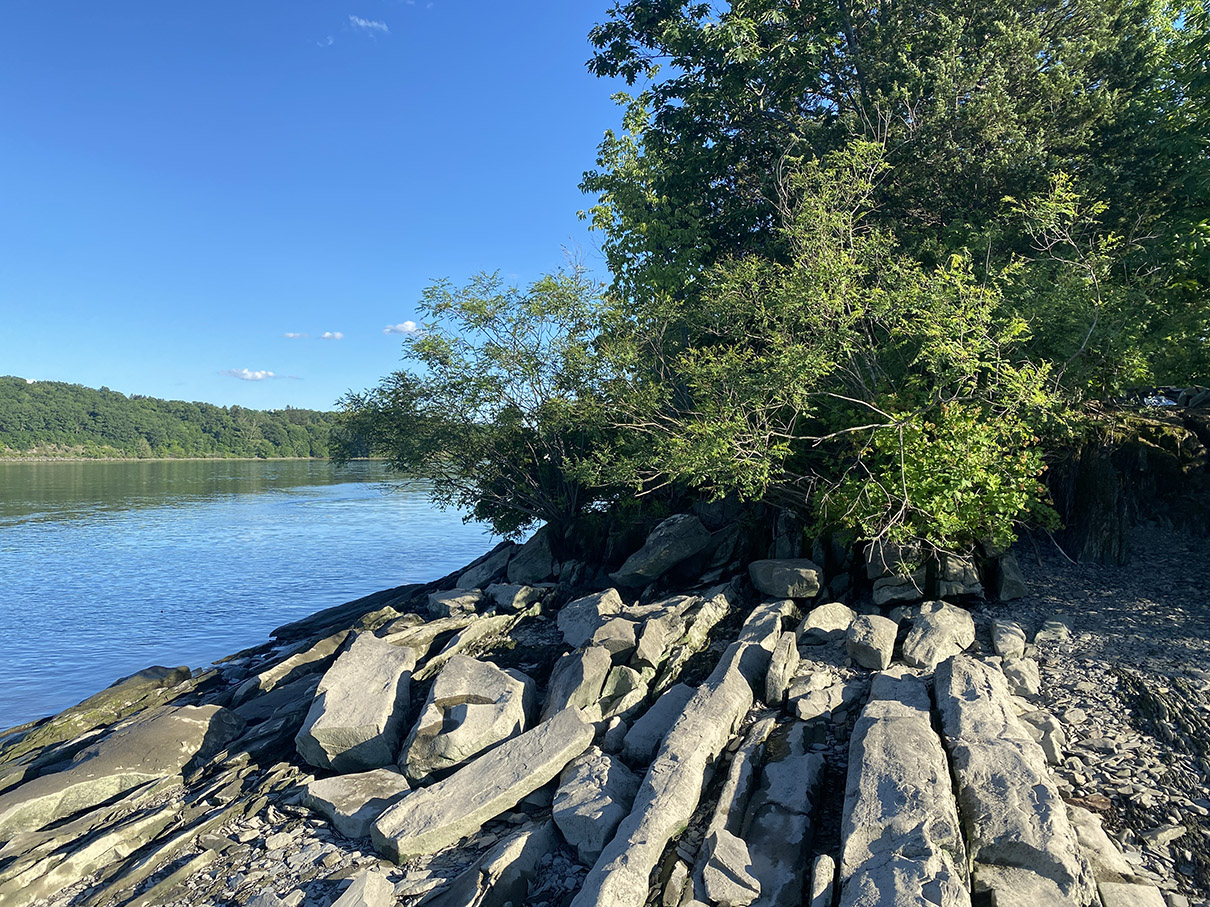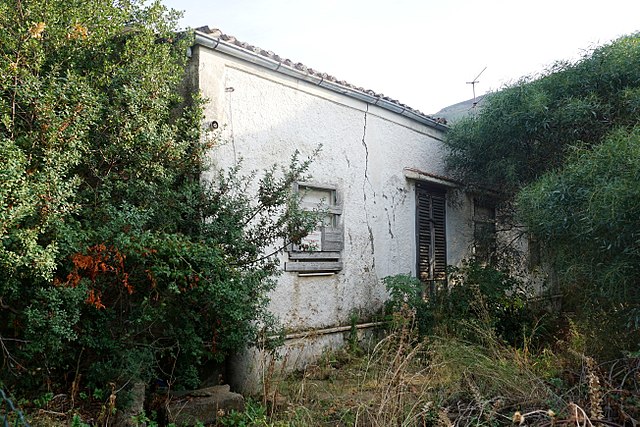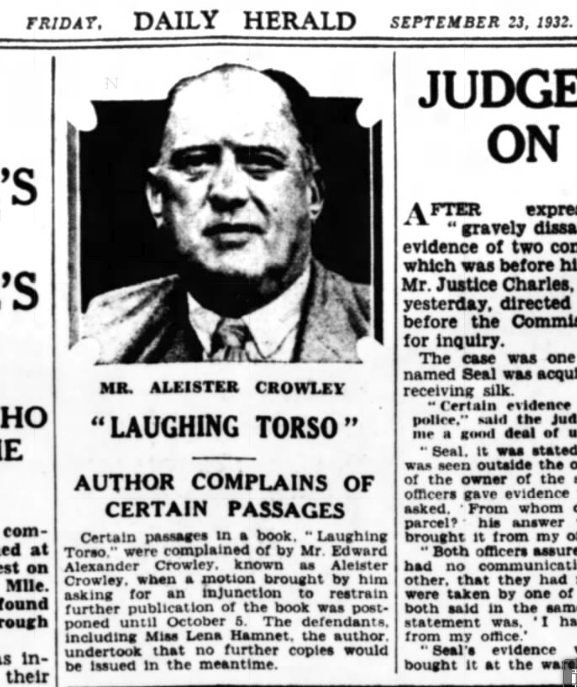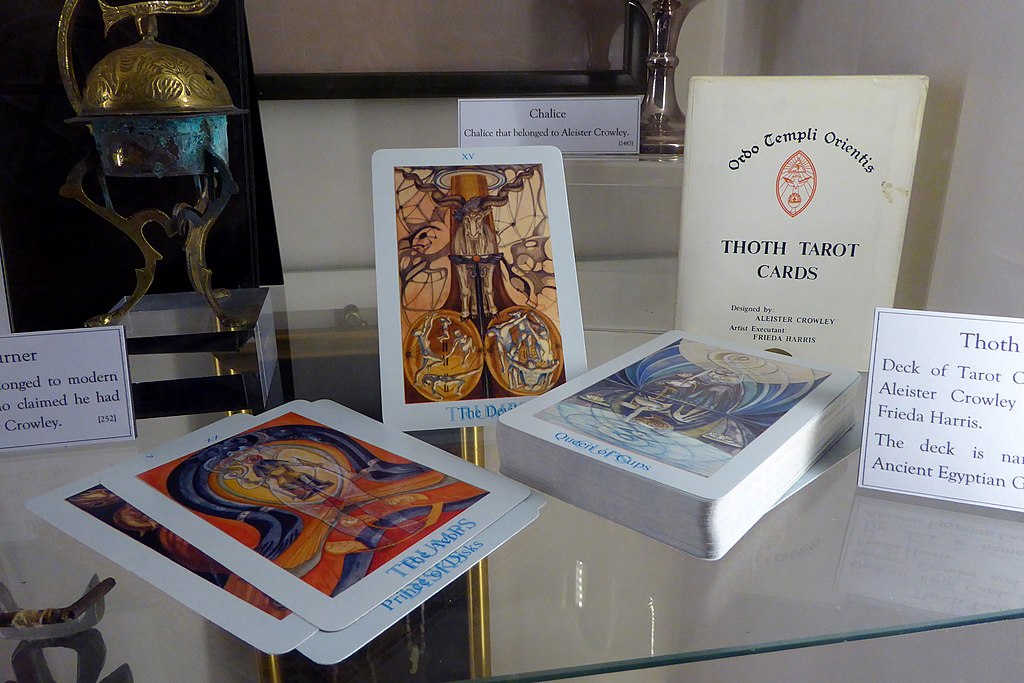Difference between revisions of "Aleister Crowley"
Occultwiki (talk | contribs) |
Occultwiki (talk | contribs) |
||
| Line 9: | Line 9: | ||
===Youth: 1875–1894=== | ===Youth: 1875–1894=== | ||
Crowley was born as Edward Alexander Crowley at 30 Clarendon Square in Royal Leamington Spa, Warwickshire, on 12 October 1875. His father, Edward Crowley (1829–1887), was trained as an engineer, but his share in a lucrative family brewing business, Crowley's Alton Ales, had allowed him to retire before his son was born. His mother, Emily Bertha Bishop (1848–1917), came from a Devonshire-Somerset family and had a strained relationship with her son; she described him as "the Beast", a name that he revelled in | Crowley was born as Edward Alexander Crowley at 30 Clarendon Square in Royal Leamington Spa, Warwickshire, on 12 October 1875. His father, Edward Crowley (1829–1887), was trained as an engineer, but his share in a lucrative family brewing business, Crowley's Alton Ales, had allowed him to retire before his son was born. His mother, Emily Bertha Bishop (1848–1917), came from a Devonshire-Somerset family and had a strained relationship with her son; she described him as "the Beast", a name that he revelled in. Crowley's father had been born a Quaker, but had converted to the Exclusive Brethren, a faction of a Christian fundamentalist group known as the Plymouth Brethren. Crowley's father was particularly devout, spending his time as a travelling preacher for the sect and reading a chapter from the [[Bible]] to his wife and son after breakfast every day. | ||
In March 1887, when Crowley was 11, his father died of tongue cancer. Crowley described this as a turning point in his life, and he always maintained an admiration of his father, describing him as "my hero and my friend" | At the age of 8, Crowley was sent to H.T. Habershon's evangelical Christian boarding school in Hastings, and then to Ebor preparatory school in Cambridge, run by the Reverend Henry d'Arcy Champney, whom Crowley considered a sadist. | ||
In March 1887, when Crowley was 11, his father died of tongue cancer. Crowley described this as a turning point in his life, and he always maintained an admiration of his father, describing him as "my hero and my friend." Inheriting a third of his father's wealth, he began misbehaving at school and was harshly punished by Champney; Crowley's family removed him from the school when he developed albuminuria. | |||
He became increasingly sceptical of [[Christianity]], pointing out inconsistencies in the Bible to his religious teachers, and went against the Christian morality of his upbringing by smoking, masturbating, and having sex with prostitutes from whom he contracted gonorrhea. Sent to live with a Brethren tutor in Eastbourne, he undertook chemistry courses at Eastbourne College. Crowley developed interests in chess, poetry, and mountain climbing, and in 1894 climbed Beachy Head before visiting the Alps and joining the Scottish Mountaineering Club. | |||
===Cambridge University: 1895–1898=== | ===Cambridge University: 1895–1898=== | ||
Having adopted the name of Aleister over Edward, in October 1895 Crowley began a three-year course at Trinity College, Cambridge, where he was entered for the Moral Science Tripos studying philosophy | Having adopted the name of ''Aleister'' over Edward, in October 1895 Crowley began a three-year course at Trinity College, Cambridge, where he was entered for the Moral Science Tripos studying philosophy. Crowley embraced his love of literature and poetry. Many of his own poems appeared in student publications. He continued his mountaineering, going on holiday to the Alps to climb every year from 1894 to 1898, often with his friend Oscar Eckenstein, and in 1897 he made the first ascent of the Mönch without a guide. These feats led to his recognition in the Alpine mountaineering community. | ||
Crowley had his first significant mystical experience while on holiday in Stockholm in December 1896. Several biographers believed that this was the result of Crowley's first same-sex sexual experience, which enabled him to recognise his bisexuality | Crowley had his first significant mystical experience while on holiday in Stockholm in December 1896. Several biographers believed that this was the result of Crowley's first same-sex sexual experience, which enabled him to recognise his bisexuality. | ||
===The Golden Dawn: 1898–99=== | ===The Golden Dawn: 1898–99=== | ||
[[File:Aleister Crowley-Golden Dawn.jpg|300px|thumb|Aleister Crowley in Golden Dawn attire]] | [[File:Aleister Crowley-Golden Dawn.jpg|300px|thumb|Aleister Crowley in Golden Dawn attire]] | ||
In August 1898, Crowley was in Zermatt, Switzerland, where he met the chemist Julian L. Baker, and the two began discussing their common interest in [[alchemy]]. Back in London, Baker introduced Crowley to George Cecil Jones, Baker's brother-in-law and a fellow member of the occult society known as the [[Hermetic Order of the Golden Dawn]], which had been founded in 1888. Crowley was initiated into the Outer Order of the Golden Dawn on 18 November 1898 by the group's leader, [[Samuel Liddell MacGregor Mathers]]. The ceremony took place in the Golden Dawn's [[Isis]]-Urania Temple held at London's Mark Masons Hall, where Crowley took the magical motto and name ''Frater Perdurabo'', which he interpreted as "I shall endure to the end". | In August 1898, Crowley was in Zermatt, Switzerland, where he met the chemist Julian L. Baker, and the two began discussing their common interest in [[alchemy]]. Back in London, Baker introduced Crowley to George Cecil Jones, Baker's brother-in-law and a fellow member of the occult society known as the [[Hermetic Order of the Golden Dawn]], which had been founded in 1888. Crowley was initiated into the Outer Order of the Golden Dawn on 18 November 1898 by the group's leader, [[Samuel Liddell MacGregor Mathers]]. The ceremony took place in the Golden Dawn's [[Isis]]-Urania Temple held at London's Mark Masons Hall, where Crowley took the magical motto and name ''Frater Perdurabo'', which he interpreted as "I shall endure to the end." | ||
Crowley moved into his own luxury flat at 67–69 Chancery Lane and soon invited a senior Golden Dawn member, Allan Bennett, to live with him as his personal magical tutor. Bennett taught Crowley more about [[ritual magic|ceremonial magic]] and the ritual use of [[recreational drug|drugs]], and together they performed the rituals of the ''[[Ars Goetia]]'', until Bennett left for South Asia to study [[Buddhism]]. | |||
In November 1899, Crowley purchased [[Boleskine House]] in Foyers on the shore of Loch Ness in Scotland. He developed a love of Scottish culture, describing himself as the "Laird of Boleskine", and took to wearing traditional highland dress, even during visits to London. | |||
Crowley | Crowley soon progressed through the lower grades of the Golden Dawn, and was ready to enter the group's inner Second Order. He was unpopular in the group; his bisexuality and libertine lifestyle had gained him a bad reputation, and he had developed feuds with some of the members, including [[W.B. Yeats]]. When the Golden Dawn's London lodge refused to initiate Crowley into the Second Order, he visited [[Samuel L. MacGregor Mathers]] in Paris, who personally admitted him into the Adeptus Minor Grade. A schism had developed between Mathers and the London members of the Golden Dawn, who were unhappy with his autocratic rule. | ||
Acting under Mathers' orders, Crowley—with the help of his mistress and fellow initiate Elaine Simpson—attempted to seize the Vault of the Adepts, a temple space at 36 Blythe Road in West Kensington, from the London lodge members. When the case was taken to court, the judge ruled in favour of the London lodge, as they had paid for the space's rent, leaving both Crowley and Mathers isolated from the group. | |||
===Mexico, India, Paris, and marriage: 1900–1903=== | ===Mexico, India, Paris, and marriage: 1900–1903=== | ||
Revision as of 15:14, 11 October 2024
Aleister Crowley, born Edward Alexander Crowley (12 October 1875 – 1 December 1947) was an English occultist, magician, poet, painter, novelist, and mountaineer. He founded the religion of Thelema, identifying himself as the prophet entrusted with guiding humanity into the Æon of Horus in the early 20th century.
A prolific writer, he published widely over the course of his life.
Crowley gained widespread notoriety during his lifetime, being a recreational drug user, bisexual, and an individualist social critic. Crowley has remained a highly influential figure over Western esotericism and the counterculture and continues to be considered a prophet in Thelema. He is the subject of various biographies and academic studies.
Early life
Youth: 1875–1894
Crowley was born as Edward Alexander Crowley at 30 Clarendon Square in Royal Leamington Spa, Warwickshire, on 12 October 1875. His father, Edward Crowley (1829–1887), was trained as an engineer, but his share in a lucrative family brewing business, Crowley's Alton Ales, had allowed him to retire before his son was born. His mother, Emily Bertha Bishop (1848–1917), came from a Devonshire-Somerset family and had a strained relationship with her son; she described him as "the Beast", a name that he revelled in. Crowley's father had been born a Quaker, but had converted to the Exclusive Brethren, a faction of a Christian fundamentalist group known as the Plymouth Brethren. Crowley's father was particularly devout, spending his time as a travelling preacher for the sect and reading a chapter from the Bible to his wife and son after breakfast every day.
At the age of 8, Crowley was sent to H.T. Habershon's evangelical Christian boarding school in Hastings, and then to Ebor preparatory school in Cambridge, run by the Reverend Henry d'Arcy Champney, whom Crowley considered a sadist.
In March 1887, when Crowley was 11, his father died of tongue cancer. Crowley described this as a turning point in his life, and he always maintained an admiration of his father, describing him as "my hero and my friend." Inheriting a third of his father's wealth, he began misbehaving at school and was harshly punished by Champney; Crowley's family removed him from the school when he developed albuminuria.
He became increasingly sceptical of Christianity, pointing out inconsistencies in the Bible to his religious teachers, and went against the Christian morality of his upbringing by smoking, masturbating, and having sex with prostitutes from whom he contracted gonorrhea. Sent to live with a Brethren tutor in Eastbourne, he undertook chemistry courses at Eastbourne College. Crowley developed interests in chess, poetry, and mountain climbing, and in 1894 climbed Beachy Head before visiting the Alps and joining the Scottish Mountaineering Club.
Cambridge University: 1895–1898
Having adopted the name of Aleister over Edward, in October 1895 Crowley began a three-year course at Trinity College, Cambridge, where he was entered for the Moral Science Tripos studying philosophy. Crowley embraced his love of literature and poetry. Many of his own poems appeared in student publications. He continued his mountaineering, going on holiday to the Alps to climb every year from 1894 to 1898, often with his friend Oscar Eckenstein, and in 1897 he made the first ascent of the Mönch without a guide. These feats led to his recognition in the Alpine mountaineering community.
Crowley had his first significant mystical experience while on holiday in Stockholm in December 1896. Several biographers believed that this was the result of Crowley's first same-sex sexual experience, which enabled him to recognise his bisexuality.
The Golden Dawn: 1898–99
In August 1898, Crowley was in Zermatt, Switzerland, where he met the chemist Julian L. Baker, and the two began discussing their common interest in alchemy. Back in London, Baker introduced Crowley to George Cecil Jones, Baker's brother-in-law and a fellow member of the occult society known as the Hermetic Order of the Golden Dawn, which had been founded in 1888. Crowley was initiated into the Outer Order of the Golden Dawn on 18 November 1898 by the group's leader, Samuel Liddell MacGregor Mathers. The ceremony took place in the Golden Dawn's Isis-Urania Temple held at London's Mark Masons Hall, where Crowley took the magical motto and name Frater Perdurabo, which he interpreted as "I shall endure to the end."
Crowley moved into his own luxury flat at 67–69 Chancery Lane and soon invited a senior Golden Dawn member, Allan Bennett, to live with him as his personal magical tutor. Bennett taught Crowley more about ceremonial magic and the ritual use of drugs, and together they performed the rituals of the Ars Goetia, until Bennett left for South Asia to study Buddhism.
In November 1899, Crowley purchased Boleskine House in Foyers on the shore of Loch Ness in Scotland. He developed a love of Scottish culture, describing himself as the "Laird of Boleskine", and took to wearing traditional highland dress, even during visits to London.
Crowley soon progressed through the lower grades of the Golden Dawn, and was ready to enter the group's inner Second Order. He was unpopular in the group; his bisexuality and libertine lifestyle had gained him a bad reputation, and he had developed feuds with some of the members, including W.B. Yeats. When the Golden Dawn's London lodge refused to initiate Crowley into the Second Order, he visited Samuel L. MacGregor Mathers in Paris, who personally admitted him into the Adeptus Minor Grade. A schism had developed between Mathers and the London members of the Golden Dawn, who were unhappy with his autocratic rule.
Acting under Mathers' orders, Crowley—with the help of his mistress and fellow initiate Elaine Simpson—attempted to seize the Vault of the Adepts, a temple space at 36 Blythe Road in West Kensington, from the London lodge members. When the case was taken to court, the judge ruled in favour of the London lodge, as they had paid for the space's rent, leaving both Crowley and Mathers isolated from the group.
Mexico, India, Paris, and marriage: 1900–1903
In 1900, Crowley travelled to Mexico via the United States, settling in Mexico City and starting a relationship with a local woman. Developing a love of the country, he continued experimenting with ceremonial magic, working with John Dee's Enochian invocations. Leaving Mexico, Crowley headed to San Francisco before sailing for Hawaii aboard the Nippon Maru.
Briefly stopping in Japan and Hong Kong, Crowley reached Ceylon, where he met with Allan Bennett, who was there studying Shaivism. The pair spent some time in Kandy before Bennett decided to become a Buddhist monk in the Theravada tradition, traveling to Burma to do so. Crowley decided to tour India, devoting himself to the Hindu practice of Rāja yoga, from which he claimed to have achieved the spiritual state of dhyana. He spent much of this time studying at the Meenakshi Temple in Madura.
In 1902, he was joined in India by Eckenstein and several other mountaineers. Together, the Eckenstein-Crowley expedition attempted K2, which had never been climbed. On the journey, Crowley was afflicted with influenza, malaria, and snow blindness, and other expedition members were also struck with illness. They reached an altitude of 20,000 feet (6,100 m) before turning back.
He returned to Boleskine House in April 1903. In August, Crowley wed Gerald's sister Rose Edith Kelly in a "marriage of convenience" to prevent her from entering an arranged marriage; the marriage appalled the Kelly family and damaged his friendship with Gerald. Heading on a honeymoon to Paris, Cairo, and then Ceylon, Crowley fell in love with Rose and worked to prove his affections.
Developing Thelema
Egypt and The Book of the Law: 1904
In February 1904, Crowley and Rose arrived in Cairo. Claiming to be a prince and princess, they rented an apartment in which Crowley set up a temple room and began invoking ancient Egyptian deities, while studying Islamic mysticism and Arabic.
During this time, Rose regularly became delirious and channeled the message: "they are waiting for you." On 18 March, she explained that "they" were the god Horus, and on 20 March proclaimed that "the Equinox of the Gods has come." She led him to a nearby museum, where she showed him a seventh-century BCE mortuary stele known as the Stele of Ankh-ef-en-Khonsu; Crowley thought it important that the exhibit's number was 666, the Number of the Beast in Christian belief, and in later years termed the artefact the "Stele of Revealing."
On 8 April he heard a disembodied voice that claimed to be that of Aiwass, the messenger of Horus, or Hoor-Paar-Kraat. Crowley said that he wrote down everything the voice told him over the course of the next three days, and titled it Liber AL vel Legis or The Book of the Law. The book proclaimed that humanity was entering a new Aeon, and that Crowley would serve as its prophet. It stated that a supreme moral law was to be introduced in this Aeon, "Do what thou wilt shall be the whole of the Law," and that people should learn to live in tune with their Will. This book, and the philosophy that it espoused, became the cornerstone of Crowley's religion, Thelema.
Crowley said that at the time he had been unsure what to do with The Book of the Law. Often resenting it, he said that he ignored the instructions which the text commanded him to perform, which included taking the Stele of Revealing from the museum, fortifying his own island, and translating the book into all the world's languages. According to his account, he instead sent typescripts of the work to several occultists he knew, putting the manuscript away and ignoring it.
The A∴A∴ and The Holy Books of Thelema: 1907–1909
With his old mentor George Cecil Jones, Crowley continued performing the Book of Abramelin rituals at the Ashdown Park Hotel in Coulsdon, Surrey. Crowley claimed that in doing so he attained samadhi, or union with Godhead, thereby marking a turning point in his life.
Making heavy use of hashish during these rituals, he wrote an essay on "The Psychology of Hashish" (1909) in which he championed the drug as an aid to mysticism. He also claimed to have been contacted once again by Aiwass in late October and November 1907, adding that Aiwass dictated two further texts to him, "Liber VII" and "Liber Cordis Cincti Serpente". Crowley stated that in June 1909, when the manuscript of The Book of the Law was rediscovered at Boleskine House, he developed the opinion that Thelema represented objective truth.
In 1907, Crowley's inheritance was running out. Trying to earn money, he was hired by George Montagu Bennett, the Earl of Tankerville, to help protect him from witchcraft; recognising Bennett's paranoia as being based in his cocaine addiction, Crowley took him on holiday to France and Morocco to recuperate. He also began taking in paying students, whom he instructed in occult and magical practice.
Victor Neuburg, whom Crowley met in February 1907, became his sexual partner and closest disciple; in 1908 the pair toured northern Spain before heading to Tangier, Morocco. The following year Neuburg stayed at Boleskine House, where he and Crowley engaged in sadomasochism. Recognising the popularity of short horror stories, Crowley wrote his own, some of which were published, and he also published several articles in Vanity Fair. He also wrote Liber 777, a book of magical and Qabalistic correspondences that borrowed from Mathers and Bennett.
Crowley became increasingly frustrated with Rose's alcoholism, and in November 1909 he divorced her on the grounds of his own adultery. Lola was entrusted to Rose's care; the couple remained friends and Rose continued to live at Boleskine. Her alcoholism worsened, and as a result she was institutionalised in September 1911.
Ordo Templi Orientis and the Paris Working: 1912–1914
In early 1912, Crowley published The Book of Lies, a work of mysticism that biographer Lawrence Sutin described as "his greatest success in merging his talents as poet, scholar, and magus."
The German occultist Theodor Reuss later accused him of publishing some of the secrets of his own occult order, the Ordo Templi Orientis (O.T.O.), within The Book. Crowley convinced Reuss that the similarities were coincidental, and the two became friends. Reuss appointed Crowley as head of the O.T.O's British branch, the Mysteria Mystica Maxima (MMM), and at a ceremony in Berlin Crowley adopted the magical name of Baphomet and was proclaimed "X° Supreme Rex and Sovereign Grand Master General of Ireland, Iona, and all the Britons."
With Reuss' permission, Crowley set about advertising the MMM and re-writing many O.T.O. rituals, which were then based largely on Freemasonry; his incorporation of Thelemite elements proved controversial in the group. Fascinated by the O.T.O's emphasis on sex magic, Crowley devised a magical working based on anal sex and incorporated it into the syllabus for those O.T.O. members who had been initiated into the eleventh degree.
In Moscow, Crowley continued to write plays and poetry, including "Hymn to Pan", and the Gnostic Mass, a Thelemic ritual that became a key part of O.T.O. liturgy.
Paris Working
In January 1914, Crowley and Neuburg settled into an apartment in Paris, where the former was involved in the controversy surrounding Jacob Epstein's new monument to Oscar Wilde.
Together Crowley and Neuburg performed the six-week "Paris Working," a period of intense ritual involving strong drug use in which they invoked the gods Mercury and Jupiter. As part of the ritual, the couple performed acts of sex magic together, at times being joined by journalist Walter Duranty. Inspired by the results of the Working, Crowley wrote Liber Agapé, a treatise on sex magic.
United States: 1914–1919
By 1914, Crowley was living a hand-to-mouth existence, relying largely on donations from A∴A∴ members and dues payments made to O.T.O. In May, he transferred ownership of Boleskine House to the MMM for financial reasons, and in July he went mountaineering in the Swiss Alps.
During this time the First World War broke out. After recuperating from a bout of phlebitis, Crowley set sail for the United States aboard the RMS Lusitania in October 1914. Arriving in New York City, he moved into a hotel and began earning money writing for the American edition of Vanity Fair and undertaking freelance work for the famed astrologer Evangeline Adams. In the city, he continued experimenting with sex magic, through the use of masturbation, female prostitutes, and male clients of a Turkish bathhouse; all of these encounters were documented in his diaries.
In Vancouver, headquarters of the North American O.T.O., he met with Charles Stansfeld Jones and Wilfred Talbot Smith to discuss the propagation of Thelema on the continent. In Detroit he experimented with peyote at Parke-Davis, then visited Seattle, San Francisco, Santa Cruz, Los Angeles, San Diego, Tijuana, and the Grand Canyon, before returning to New York. There he befriended Ananda Coomaraswamy and his wife Alice Richardson; Crowley and Richardson performed sex magic in April 1916, following which she became pregnant and then miscarried. Later that year he took a "magical retirement" to a cabin by Lake Pasquaney owned by Evangeline Adams. There, he made heavy use of drugs and undertook a ritual after which he proclaimed himself "Master Therion."
In December, he moved to New Orleans, his favourite US city, before spending February 1917 with evangelical Christian relatives in Titusville, Florida before returning to New York City.
In 1918, Crowley went on a magical retreat in the wilderness of Esopus Island on the Hudson River. Here, he began a translation of the Tao Te Ching, painted Thelemic slogans on the riverside cliffs, and—he later claimed—experienced past life memories of being Ge Xuan, Pope Alexander VI, Alessandro Cagliostro, and Eliphas Levi.
Abbey of Thelema: 1920–1923
Crowley had ideas of forming a community of Thelemites, which he called the Abbey of Thelema after the Abbaye de Thélème in François Rabelais' satire Gargantua and Pantagruel. After consulting the I Ching, he chose Cefalù (on Sicily, Italy) as a location, and after arriving there, began renting the old Villa Santa Barbara as his Abbey on 2 April.
Crowley described the scenario as "perfectly happy ... my idea of heaven." Members wore robes and performed rituals to the sun god Ra at set times during the day. He offered a libertine education for the children, allowing them to play all day, freely use drugs, and witness acts of sex magic.
In February 1922, Crowley returned to Paris for a retreat in an unsuccessful attempt to kick his heroin addiction. He then went to London in search of money, where he published articles in The English Review criticising the Dangerous Drugs Act 1920 and wrote a novel, Diary of a Drug Fiend, completed in July.
Loveday death
Subsequently, a young Thelemite named Raoul Loveday moved to the Abbey with his wife Betty May; while Loveday was devoted to Crowley, May detested him and life at the commune. She later said that Loveday was made to drink the blood of a sacrificed cat, and that they were required to cut themselves with razors every time they used the pronoun "I."
Conditions at the Abbey were unsanitary, and wild dogs and cats wandered throughout the building. Loveday drank from a local polluted stream, soon developing a liver infection resulting in his death in February 1923.
Returning to London, May told her story to the press. John Bull proclaimed Crowley "the wickedest man in the world" and "a man we'd like to hang." The Fascist government of Benito Mussolini learned of Crowley's activities, and in April 1923 he was given a deportation notice forcing him to leave Italy; without him, the Abbey closed.
Later life
Berlin and London: 1930–1938
In August 1931, he took Bertha Busch as his new lover; they had a violent relationship, and often physically assaulted one another. He continued to have affairs with both men and women while living in Berlin, and met with famous people like Aldous Huxley and Alfred Adler.
Back in London, in need of money, Crowley launched a series of court cases against people whom he believed had libelled him, some of which proved successful. He gained much publicity for his lawsuit against Constable and Co. for publishing Nina Hamnett's Laughing Torso (1932)—a book he claimed libelled him by referring to his occult practice as black magic—but lost the case. The court case added to Crowley's financial problems, and in February 1935 he was declared bankrupt. During the hearing, it was revealed that Crowley had been spending three times his income for several years.
Crowley developed a friendship with Deidre Patricia Doherty; she offered to bear his child, who was born in May 1937. Named Randall Gair, Crowley nicknamed him Aleister Atatürk. He died in a car accident in 2002 at the age of 65. In 1936, he published his first book in six years, The Equinox of the Gods, which contained a facsimile of The Book of the Law.
In 1937 he gave a series of public lectures on yoga in Soho. Crowley was now living largely off contributions supplied by the O.T.O.'s Agape Lodge in California, led by rocket scientist Jack Parsons. Crowley was intrigued by the rise of Nazism in Germany, and influenced by his friend Martha Küntzel believed that Adolf Hitler might convert to Thelema; when the Nazis abolished the German O.T.O. and imprisoned Germer, who fled to the US, Crowley then lambasted Hitler as a black magician.
Death
On 1 December 1947, Crowley died at Netherwood of chronic bronchitis aggravated by pleurisy and myocardial degeneration at the age of 72. His funeral was held at a Brighton crematorium on 5 December; about a dozen people attended, and Louis Wilkinson read excerpts from the Gnostic Mass, The Book of the Law, and "Hymn to Pan."
The funeral generated press controversy, and was labelled a Black Mass by the tabloids. Crowley's body was cremated, his ashes were sent to Karl Germer in the United States, who buried them in his garden in Hampton, New Jersey.
Legacy and influence
Crowley has remained an influential figure, both amongst occultists and in popular culture, particularly that of Britain, but also of other parts of the world. In 2002, a BBC poll placed Crowley seventy-third in a list of the 100 Greatest Britons.
Thelema continued to develop and spread following Crowley's death. In 1969, the O.T.O. was reactivated in California under the leadership of Grady Louis McMurtry; in 1985 its right to the title was unsuccessfully challenged in court by a rival group, the Society Ordo Templi Orientis, led by Brazilian Thelemite Marcelo Ramos Motta.
Several Western esoteric traditions other than Thelema were also influenced by Crowley, with Djurdjevic observing that "Crowley's influence on twentieth-century and contemporary esotericism has been enormous". Gerald Gardner, founder of Gardnerian Wicca, made use of much of Crowley's published material when composing the Gardnerian ritual liturgy. L. Ron Hubbard, the American founder of Scientology, was involved in Thelema in the early 1940s (with Jack Parsons), and it has been argued that Crowley's ideas influenced some of Hubbard's work.
Despite the fact that Crowley was not a Satanist, he embodied the pre-Satanist esoteric discourse on Satan and Satanism through his lifestyle and his philosophy. Two prominent figures in religious Satanism, Anton LaVey and Michael Aquino, were influenced by Crowley's work.
His Thoth Tarot is widely regarded as one of the greatest Tarot decks ever created. The accompanying Book of Thoth explores the esoteric mysteries of the Tarot.
In popular culture
- In his novel The Devil Rides Out, the writer Dennis Wheatley used Crowley as a partial basis for the character of Damien Morcata, a portly bald defrocked priest who engages in black magic.
- The occultist Dion Fortune used Crowley as a basis for characters in her books The Secrets of Doctor Taverner (1926) and The Winged Bull(1935).
- He was included as one of the figures on the cover art of The Beatles' album Sgt. Pepper's Lonely Hearts Club Band (1967).
- Ozzy Osbourne and his lyricist Bob Daisley wrote a song titled "Mr. Crowley" (1980).
- His image was included as The World card in the Magicians, Martyrs, and Madmen Tarot (2023).
External links
- Aleister Crowley Collection at the Harry Ransom Center, University of Texas
- The Libri of Aleister Crowley – online editions of Crowley writings
- "Aleister Crowley and the Abbey of Thelema in Cefalù" at WondersOfSicily.com, with photos
- Perdurabo (Where is Aleister Crowley?) – film on the Abbey of Thelema by Carlos Atanes
